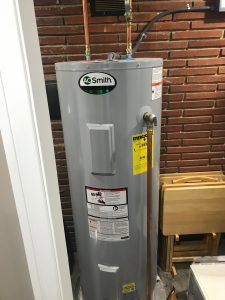Most Water Heater Problems
Most Water Heater Problems
Blog Article
This article below about Common Problems with Tank Water Heaters is quite attention-grabbing. Give it a go and make your own conclusions.

Picture beginning your day without your regular hot shower. That currently sets an inadequate tone for the rest of your day.
Every home needs a dependable hot water heater, yet only a few understand just how to handle one. One very easy way to keep your water heater in top form is to check for mistakes routinely as well as fix them as soon as they show up.
Keep in mind to turn off your water heater before sniffing about for mistakes. These are the water heater faults you are most likely to run into.
Water also warm or as well cool
Every hot water heater has a thermostat that figures out how hot the water gets. If the water entering into your residence is too warm in spite of establishing a practical maximum temperature level, your thermostat might be defective.
On the other hand, too cold water might be due to a failed thermostat, a busted circuit, or inappropriate gas circulation. As an example, if you use a gas hot water heater with a busted pilot light, you would certainly get cold water, even if the thermostat is in ideal condition. For electrical heaters, a blown fuse might be the perpetrator.
Inadequate hot water
Hot water heater come in several sizes, depending upon your hot water demands. If you lack warm water prior to everyone has had a bath, your water heater is too tiny for your family size. You must consider setting up a larger water heater container or opting for a tankless water heater, which uses up less room and also is more resilient.
Weird noises
There are at least five sort of noises you can learn through a water heater, yet one of the most usual analysis is that it's time for the hot water heater to retire.
First off, you ought to recognize with the normal sounds a water heater makes. An electric heating unit may appear different from a gas-powered one.
Popping or banging sounds normally suggest there is a slab of sediment in your tanks, and also it's time to cleanse it out. On the other hand, whistling or hissing noises might just be your valves allowing some pressure off.
Water leakages
Leaks can originate from pipes, water links, valves, or in the worst-case circumstance, the tank itself. With time, water will wear away the tank, as well as find its escape. If this happens, you require to replace your hot water heater as soon as possible.
Nonetheless, before your modification your entire container, make sure that all pipelines are in area which each valve functions completely. If you still need aid identifying a leakage, call your plumber.
Rust-colored water
Rust-colored water suggests one of your hot water heater parts is corroded. Maybe the anode rod, or the tank itself. Your plumber will be able to identify which it is.
Warm water
Regardless of how high you set the thermostat, you won't get any kind of warm water out of a heating unit well past its prime. A hot water heater's performance may reduce with time.
You will certainly additionally get lukewarm water if your pipelines have a cross link. This implies that when you turn on a faucet, warm water from the heater moves in alongside normal, cold water. A cross link is very easy to place. If your hot water taps still follow shutting the water heater valves, you have a cross link.
Discoloured Water
Rust is a major cause of filthy or discoloured water. Rust within the water container or a falling short anode pole might trigger this discolouration. The anode rod secures the storage tank from rusting on the inside and must be checked yearly. Without a rod or a properly operating anode rod, the hot water quickly wears away inside the container. Contact an expert water heater technician to figure out if changing the anode pole will deal with the issue; if not, change your water heater.
Verdict
Preferably, your water heater can last 10 years prior to you require a modification. However, after the 10-year mark, you might experience any of these mistakes extra on a regular basis. At this moment, you must add a brand-new hot water heater to your budget.
How To Troubleshoot 3 Common Water Heater Problems in Twin Cities
The Water Heater Is Leaking
A leaky cold water inlet valve A loose pipe fitting A leaky temperature and pressure relief valve A corroded anode rod A cracked tank Turn Off Your Water Heater:
Shut off your gas water heater by turning the gas valve on the unit to the “OFF” position. Shut off your electric water by switching its power off at your electrical panel. Look for a two-pole breaker labeled “water heater” and turn it to the “OFF” position. Move the ball valve connected to the water heater to be perpendicular to the piping at a 90° angle. Look for the Leak:
Depending on whether the water is coming from the tank's top or bottom, you’ll want to look for the leak in different locations.
If the leak comes from the top of the tank, carefully look for water escaping from the cold water inlet valve or loose pipe fittings. Rusted hot and cold water valves can have loose connections with the tank, with water leaking out of them.
https://mspplumbingheatingair.com/blog/how-to-troubleshoot-3-common-water-heater-problems
We were shown that write-up about Common Problems with Your Home Water Heater from an associate on another site. Don't hesitate to set aside a second to share this content if you appreciated it. We take joy in reading our article about Water Heaters Problems.
Excellence awaits, dial! Report this page